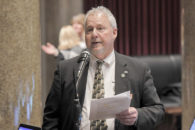Jefferson City, Mo. — Gov. Mike Parson will bring the Missouri General Assembly into Jefferson City on Sep. 6 to work on multiple tax-related pieces of legislation.
The most talked about and controversial piece of legislation is Parson’s proposal on income tax cuts that he announced at a press conference Monday afternoon. Parson vetoed HB 2090, a bill that aimed to give both married couples and single filers a tax rebate based on their income tax liability, on July 1.
Parson has come back with a much different proposal than that outlined in HB 2090. On Monday afternoon the Governor outlined his plan to drop the income tax rate from 5.3% to 4.8%. Parson’s plan would also eliminate the bottom tax bracket.
Senate Minority Leader John Rizzo, D-Jackson County, added an amendment to HB 2090 that put an income cap on those who could receive the refund of $150,000 for singles and $300,000 for joint filers. Parson opposed the amendment prior to vetoing the bill, the St. Louis Post Dispatch reported.
“Senate Democrats approved targeted tax relief for working families … the Governor vetoed it,” Rizzo said in a statement. “We’ll carefully review his new proposal … if there is a tax cut it should benefit the middle-class working families in Missouri.”
Parson will meet with Democratic leadership in the House Tuesday to discuss his plan.
Stakeholders, specifically the AARP, previously criticized HB 2090 for being based on income tax liability, meaning Missouri’s lowest earners would see the least amount of help. Parson’s proposal may be able to fix that issue if he gets his way during special session.
“Our tax cut proposal means that every taxpaying Missourian, no matter their background, income, or job description, will see a reduction in their tax liability,” Parson said. “Every Missourian will earn their first $16,000 tax-free and married joint filers will earn their first $32,000 tax-free, resulting in significant savings for millions of Missourians.”
During his press conference, Parson put his proposal in perspective, citing that a senior making $20,000 a year would see a 100% decrease in income tax liability.
Still, the cut being income-tax-based would benefit the wealthy more than lower earners, as paying a lower percentage of income tax becomes more beneficial with the more income one makes. Detractors from the plan have pointed to former Kansas Gov. Sam Brownback’s tax cut disaster, criticizing Parson for using temporary federal relief funds to cover the loss in revenue from tax cuts.
“While Governor Parson focused on how certain struggling individuals might pay less in taxes, the proposals discussed today remain heavily weighted to benefit the wealthiest Missourians,” Amy Blouin, president of the Missouri Budget Project said in a press release shortly after Parson’s press conference.
“Relying on the current surplus to fund permanent tax changes isn’t fiscally sustainable, or responsible, and will ultimately require cuts to state services like we saw in Kansas a few years ago,” she added.
Parson believes his proposal is sustainable, he addressed concerns about reliance on federal money at his press conference.
“We’re not factoring in federal money with this,” Parson said. “This is general revenue in the state … we believe we can sustain this.”
The state may soon have an influx in revenue to cover the income tax cut, pending the legalization and taxation of the recreational use of marijuana. Legal Missouri 2022, the campaign which got marijuana legalization on the ballot through an initiative petition, estimates that legal cannabis would generate $40.8 million annually for the state.
Parson hopes to get the income tax bill done quickly, noting that he’s met with a lot of state legislators, the majority of which have supported Parson’s plan.
“I welcome Gov. Parson’s call for a special session — and I plan to file a bill on the first day to cut taxes for every family in Missouri,” Sen. Lincoln Hough. R-Springfield, said. “Allowing Missourians to make more income before they actually have to file taxes is continuing to remove burdensome government from the lives of everyday Missourians.”
Despite expected pushback from across the aisle and within his own party, Parson believes that he has put a good proposal on the table.
“The Senate rule has the chance to come together, on both sides of the aisle, for what’s good for all Missourians,” he said.
Parson also spoke about his plans for agriculture tax credit programs. Parson vetoed HB 1720 in July over concerns about the two-year extension period. His new proposal extends and creates nearly a dozen tax credit programs for agriculture providers and sets a minimum time of six years before the programs need to be renewed.
“Vetoing an ag bill is not something I took lightly or wanted to do,” Parson said. “But we cannot leave our farmers, ranchers and business owners with a bad deal.”
Featured Image Courtesy of Governor Mike Parson (Facebook)

I’m a journalist hailing from the Detroit area. I love to tell investigative stories with a focus on everyday people.
You can contact me by email at matthew@missouritimes.com






























